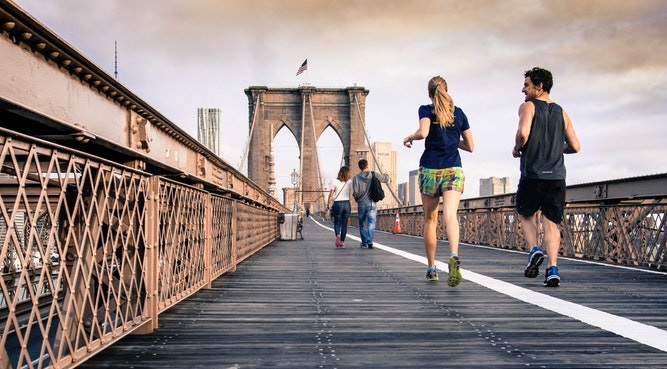Alexa Travels > The Journey > The Journey > 15 Tips for Staying Healthy on the Road
15 Tips for Staying Healthy on the Road
Traveling can be an energizing and fulfilling experience, but it wrenches us out of routine in a way that may upset our healthiest habits. Navigating new environments can take a toll on us physically and mentally, and along with the joy of exciting new sights and smells come pathogens that our immune systems have not adapted to. The following are a series of tips to help you stay healthy on the road.
#1 Pack Light
The weight of baggage and backpacks can wear on our muscles and joints and schlepping heavy luggage around the world adds stress to the journey. Pair down what you need to versatile essentials, and if you will have access to a laundromat during your travels you can pack even less. Check out my pro tips on packing light here. In addition, packing light allows for extra space for souvenirs.

#2 Hydrate, Hydrate, Hydrate
Perhaps the single most important thing you can do for your body while traveling is to keep it hydrated. Carry a refillable water bottle if possible. Drink plenty of water while flying as the cabin of a plane usually maintains a humidity level of 10 to 20 percent, far lower than what our skin is happiest at between 40 and 70 percent. Upon arrival enjoy those exotic cocktails, but wash them down with plenty of water. If you plan to engage in athletic or physical activities in the heat, consider packing Oral Rehydration Salts (ORS) to replace lost electrolytes.
#3 Drink Clean Water
This sounds like a no-brainer, but the level of water filtration and treatment varies greatly between contexts. Inquire if the available water is potable. Do locals drink water from the tap? Do visitors? Opt for bottled water and avoid ice in restaurants and roadside stalls when in doubt. Make it a habit to travel with Water Purification Tablets just in case.
Pro tip: In extremely resource-poor contexts where struggling vendors may refill used plastic water bottles from taps, buying sparkling water assures the bottle is manufacturer-sealed.
#4 Take Time to Streeeetch
Dedicate 5 to 15 minutes in the morning or before adventuring to stretch your body for improved circulation. Make it a habit to stretch and move around every 2-3 hours on a flight, as any mode of transportation that puts you in an immobile state for more than 4 hours increases your risk of a pulmonary embolism or deep vein thrombosis (dangerous blood clots). Build a small travel yoga routine for yourself and make it a daily morning ritual. Stretching is good for the body and soul.
#5 Walk Everywhere
Save money and burn calories by building walking into your day. Opt for more centrally located accommodations which facilitate walking to restaurants and sites. Walking is a pace that allows us to discover minute details missed from motorized transport—you can literally stop and smell those beautiful roses! If you are a couch potato, try to work up to this before your trip by taking long walks.
#6 Incorporate Exercise into Your Trip
Traveling can disrupt our normal fitness routines but there are always available activities to keep us moving. Take the stairs instead of the elevator, rent bicycles to explore a new city, or seek out a challenging hike. Exercise keeps us healthy by boosting our immune system and keeping foreign pathogens at bay. You can head out for a morning run on your own or connect with an international fitness group such as November Project or HASH. Whatever your favorite athletic pastime, there is a good chance you can find others who engage in the same wherever you go.
#7 Don’t Forget to Sleep!
Unless you are on a whirlwind weekend trip, traveling is a marathon, not a sprint. Sleep is needed to restore, regenerate, and de-stress. The average adult requires between 7 and 8 hours of sleep per night, and this can be difficult to achieve on the road. A sleep mask and earplugs can help cancel out light and noise. Consider traveling with Melatonin Supplements to promote sleep. Oh, and learn to embrace power naps—it’s a honed skill that has saved my trip more than once.
#8 Mitigate Jet Lag
What is jet lag exactly, anyway? In essence, it’s the unfortunate side effect of crossing time zones which messes with our bodies’ circadian rhythm and adjustment to daylight patterns. Jet lag can leave us groggy and disoriented, but there are two key strategies for mitigating its effects. The expression goes that “west is best, east is a beast” because our bodies best cope with heading west (giving us a longer day) than heading east (giving us a shorter day). The key strategy for heading west is simply to stay up until a generally acceptable bedtime, thereby jumpstarting your body into a somewhat normal sleeping pattern. Heading east is difficult because when everyone else heads to bed you may still be full of energy. The best way to combat jet lag in this direction is by conditioning yourself to stay up later before you depart. Once you arrive, feel free to use any additional tricks up your sleeve to help yourself fall asleep at a decent hour.
#9 Remember Your Fruits and Veggies
Aside from being delicious, fruits and veggies are foundational for health, although easily forgotten when traveling and everything seems to consist of fried fat and carbohydrates. Seek out fresh, whole fruit to satiate hunger and keep your levels of water-soluble vitamins adequate. Purposely including vegetables on our plates keeps us consuming fiber, which supports digestive regularity. HOWEVER in contexts of questionable hygiene, it is best to consume fruit whole which you peel yourself and vegetables which are thoroughly cooked.
#10 Take Probiotics
Consider traveling with Probiotics which do not require refrigeration. Research is increasingly showing links between health and diverse colonies of beneficial bacteria in our gut. These bacteria have been shown to aid digestion and nutrient absorption while contributing to immune function. Although cultured and fermented foods naturally containing probiotics can be found in many culinary traditions (think yogurt, sauerkraut, and kimchi) probiotic supplements are a great way to boost your reserves while on the road.
#11 Make Sure your Immunizations are Up-to-Date
Visit a travel physician at least 4 to 6 weeks prior to your trip to make sure your vaccinations are in order, as it can take several weeks before immunizations reach their strongest protective level. A good travel physician will walk you through which immunizations are most important given the context and which are required by your destination country—for example, you will not pass customs without evidence of a yellow fever vaccine in Senegal or a polio vaccine in Pakistan.
#12 Protect Your Skin
Nothing can ruin a trip faster than a skin searing sunburn. Be aware of your limits for your skin type and make it a habit to moisturize and apply sunscreen regularly. Pack polarized sunglasses and consider a big floppy hat if you’ll be in the sun for long periods of time. Reverting back to the conversation about low humidity environments in airplanes, moisturize before you fly to maintain your skin’s healthiest hydration level.
Pro tip: for those with darker skin who tan easily and rarely burn and won’t be exposed to sunlight for long periods of time, coconut oil naturally provides a low level of sun protection (SPF 8).
#13 Carry a First Aid Kit
When your attempts to maintain perfect health while traveling fail (which they are bound to do from time to time) be prepared. An effective first aid kit doesn’t have to be big and bulky, but can literally be a lifesaver. You can purchase a kit or assemble your own. Here I have listed the emergency kit I created for my last cycling adventure.
#14 Practice Safe Sex
The same rules apply even in the sexiest of travel destinations, so wrap it up and pack sufficient birth control for your trip. If traveling with a hormonal birth control be cognizant of the effect of temperature fluctuations (such in the case of the NuvaRing) on birth control effectiveness, and emergency contraception is not a bad addition to a comprehensive first aid kit (I like to think that I saved a friend’s life once while overseas!). More comprehensive resources on birth control are available here.
#15 Write
The mental health challenges associated with travel are simply not discussed enough. Experiencing other countries and cultures can both lift our spirits and shake us to the core. Take time to write about your experiences to process all that you are being exposed to. Writing can also be a form of active meditation, allowing us time to breathe and reflect on any anxieties the journey has unearthed. On a happier note, writing about our experiences also creates a cherished memory to be revisited later on. Whether a journal or the back of a napkin, write, write, write!
The above tips for staying healthy on the road are geared toward your average adventurer. Modify them to specifically meet your needs and follow them during your travels and I’m sure your body and mind will thank you. This is by no means a complete list, and please share any great tips I missed in the comments section below.

